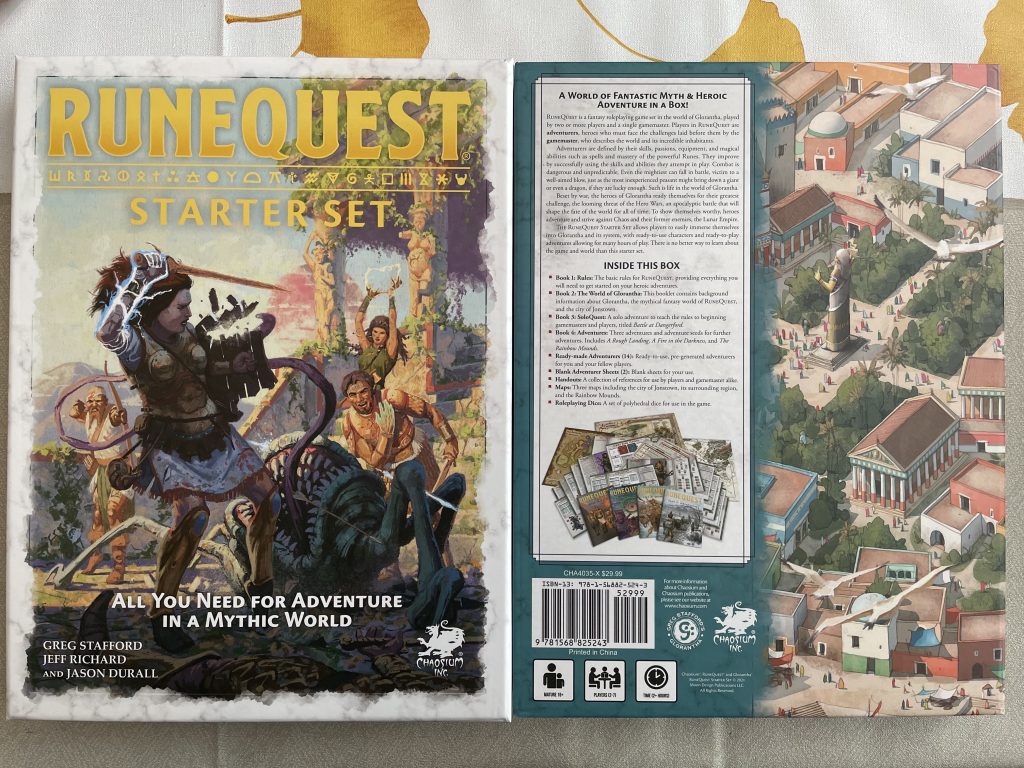
Since I wrote my RuneQuest Starter Set review, I’ve had some time to mull it over a bit longer and, more importantly, I listened to Baz’ excellent RuneQuest Year Zero podcast which provided many revelatory insights. I figured that the latest episode of his podcast was as good an opportunity as any to revisit my opinions, although it means that this article might turn into a bit of a direct reply to Gaz, rather than a truly standalone post. I’ll try my best to stay close to the latter however.
Who Is This Box For?
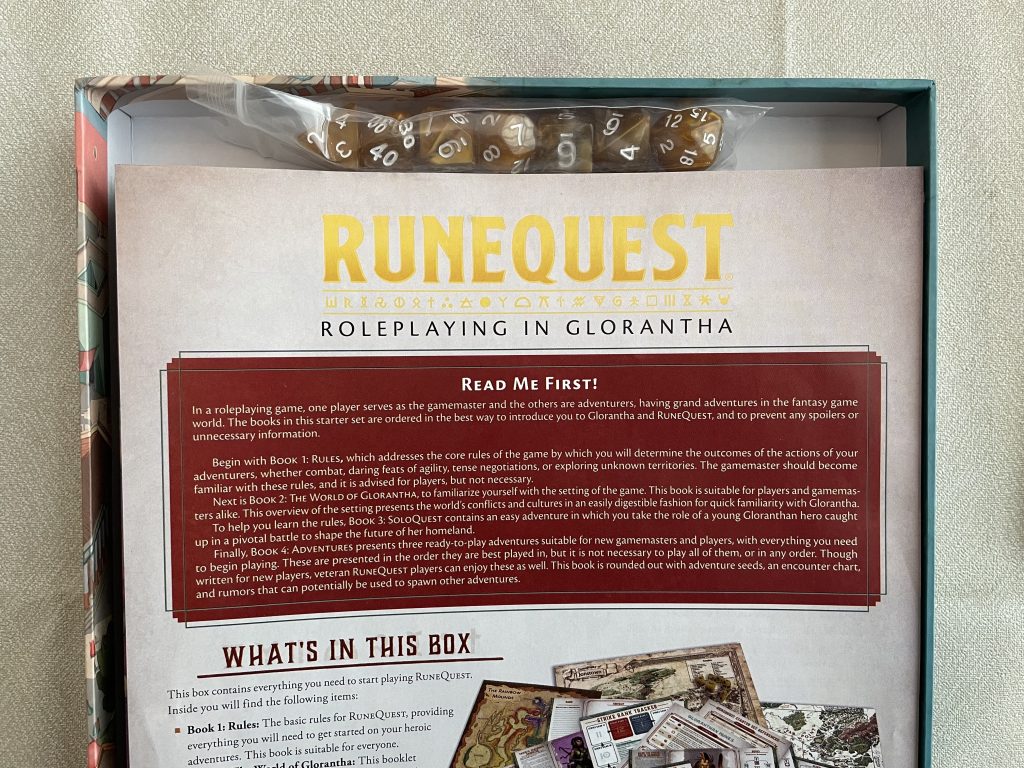
I’ve seen this question asked a few times of not only the RuneQuest Starter Set but also other ones, such as the recent One Ring Starter Set. It might seem like a tricky question to answer, and many people certainly tiptoe around it, but it’s obvious as far as I’m concerned: it’s for everybody, newbies and veterans alike. I’m pretty sure that only WotC can afford to think about market segmentation at this point, so of course all the other game companies want their Starter Set to appeal to the biggest audience: that’s what it’s for!
The presence of dice in the box is, as Gaz pointed out, a dead giveaway of this, but that’s not the whole story, I think. These dice could also be directed at D&D and Pathfinder players who might not own, say, a correctly marked D10 duo for use with D100 systems (i.e. one D10 marked as “tens” and one marked as “singles”).
Agreed, I doubt that many people will enter the hobby through the RuneQuest Starter Set. There’s a much higher chance that they do through the Call of Cthulhu Starter Set. But it’s a tough proposition for Chaosium to cut themselves entirely from the newbie market by making the RuneQuest Starter Set only suitable for RPG veterans, and I can’t blame them for that. Would the box have been better with more hand-holding for true newcomers, such as an example of play with the usual written-out dialogue between gamemaster and players? Yes, surely. But frankly, I have haven’t been an RPG newbie since the early 1990s, and kids are clever enough on their own, so I don’t know if they really need that much hand-holding or not. I’m not sure we got much of it either in our day. But I’d love to hear some witness account of a genuine RPG newbie reading any Starter Set.
The one decision that would have been easy to make is to ignore the Gloranthan veterans for this particular product. But I don’t think it would have significantly changed it: the value proposition for veterans is that three out of the four scenarios (if we include SoloQuest in the lot) are new adventures, and that the adventurers’ “homebase”, Jonstown is a previously somewhat unpublished area. Changing these contents to be, say, updated well-known adventures, with an updated well-known home base, wouldn’t have made anything better for newbies. I think Chaosium made the right decision here.
The Pre-Generated Problem
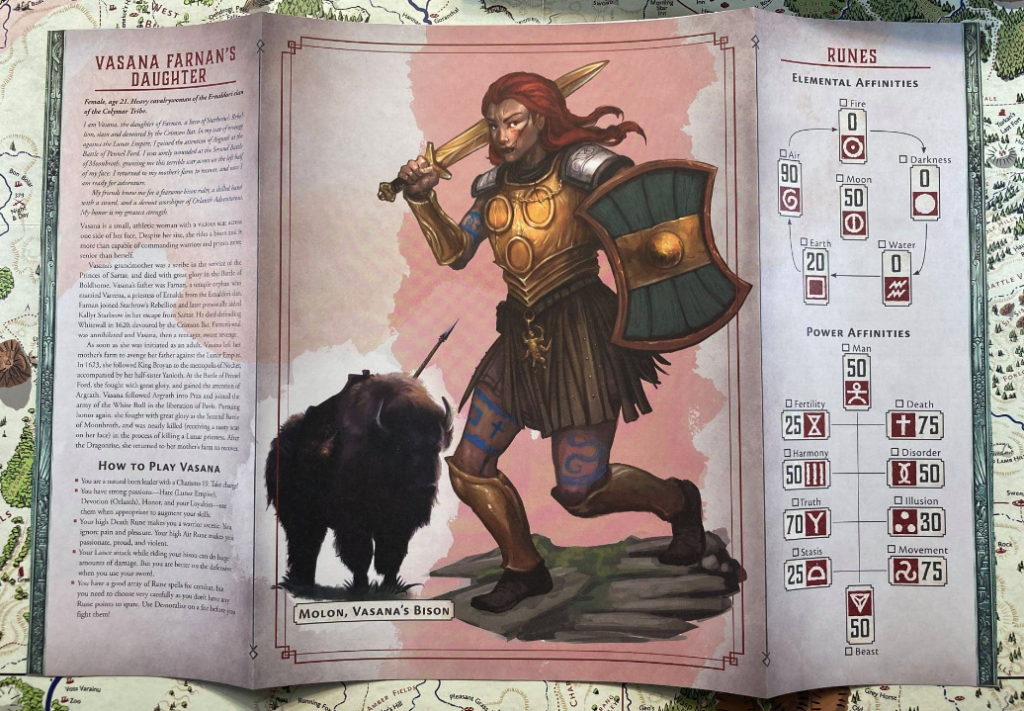
Another “issue” I’ve heard a lot about is the lack of character generation rules. I’m a bit confused by this because if you look at the market, very few starter sets actually include those. As far as I can tell, Warhammer doesn’t, Tales from the Loop doesn’t, Symbaroum doesn’t, Alien doesn’t, The One Ring doesn’t, and D&D 5e doesn’t (although the Essentials Kit does) Cyberpunk RED and Call of Cthulhu do have some character creation rules, but they are extremely simplified: the former uses “templates” (barely a step up from a pre-gen), and latter uses fixed characteristic scores to be allocated, along with eight minimal occupation templates. Possibly only the Pathfinder Beginner Box has proper character creation? Mmmh… maybe I should check it out.
Now I can totally buy the argument that the pre-generated characters in the RuneQuest Starter Set were not ideal. For instance, Baz notes that it might have been better to tie more pre-gens together, to show (instead of tell!) how “community” is indeed important in Glorantha. I think I agree with Baz here, and that’s one of the many great insights from his podcast. The first three characters are linked by their belonging to the Colymar tribe, but the others are a ragtag bunch from all around Dragon Pass and beyond. Maybe it would have been even better to not re-use the Quickstart and rulebook pre-generated characters, and instead make entirely new ones that all belong to tribes from around Jonstown — that’s the “setting” of the Starter Set box after all, so why not tie the characters to it completely?
Another point is that the Starter Set rules do a fairly good job of culling out any rules that aren’t needed for the pre-gens or for the adventures. This is why we don’t have rules for, say, Runemasters and shamans and enchantments and such, or why we only have the spells that are used by either characters or NPCs. Maybe removing Vishi Dunn and Sorala would have simplified things further, since they are the only characters who need, respectively, the assistant shaman rules and the sorcery rules. But maybe the designers really wanted people to be able to get a “taste” of each part of the setting. Would a Cyberpunk Starter Set be “simpler” and “more focused” if you didn’t have any netrunner player character? Or would you be missing out on one of the most interesting parts of the game?
The answer is obvious to me as far as a Cyberpunk Starter Set is concerned. For RuneQuest, it’s less obvious, but I think I would have personally cut Sorala out (no sorcery) but kept Vishi Dunn, for shamans and the spirit world are one of the most interesting aspects of Glorantha. How much space does that save, though? Half a page for the Sorcery entry in Book 1. Heh. Not much, compared to possibly exciting the curiosity of a few readers.
Focused Content
While we’re talking about cutting content, Baz is arguing for a lot of changes in order to fit character creation rules in what is already the heaviest box on the market today (I know because I’ve weighed it!) I already addressed the character creation rules above, but we could still reconsider the other books anyway. In my review I lamented the dryness of the Jonstown write-up. If there was room for more pages, maybe Chaosium could have made it more lively, full of intrigue and factions like Warhammer’s Ubersreik! So let’s take a look back.
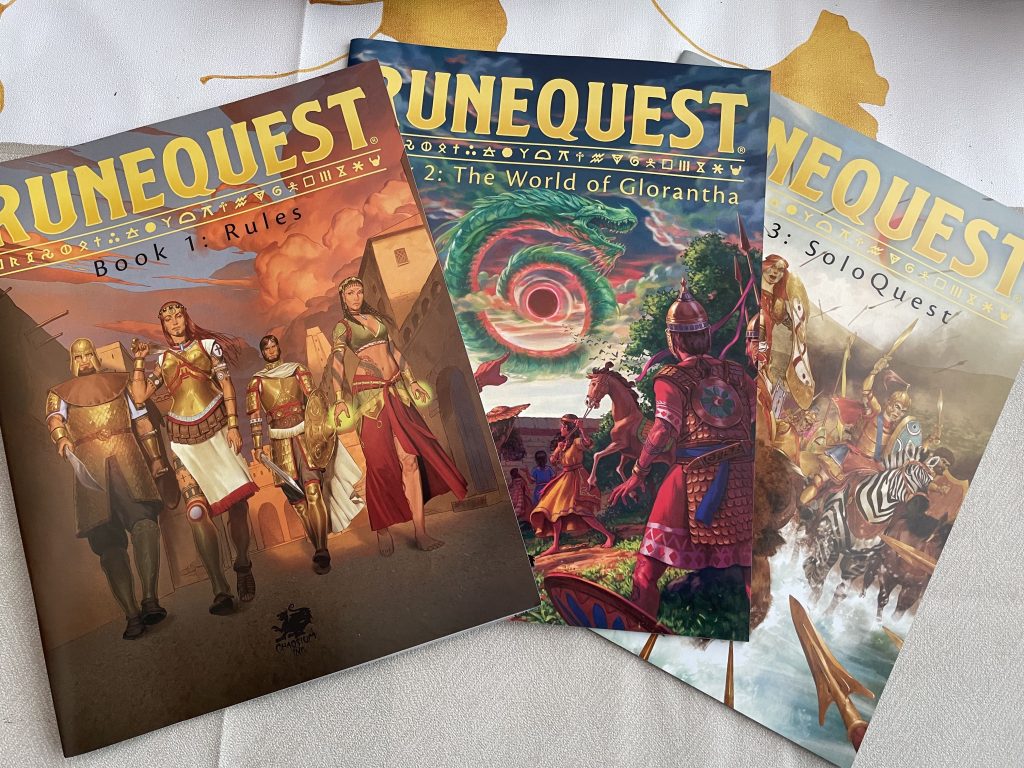
Book One
The first book is the rulebook, which is arguably “meatier” than what I’d like for a Starter Set, but that’s a RuneQuest problem, not a Starter Set problem. It’s important for me that a Starter Set be as close as possible to the rules in the core rulebook. Baz’s proposition to simplify it down to a few pages, without hit locations and even maybe with just a D10 instead of a D100, sounds absolutely horrible to me.
The reason is simple: a Starter Set is meant to get me started with a game, hopefully soon followed with buying other books such as a rulebook or some more adventures. If I’m getting excited about a game with simple mechanics, but as soon as I buy the rulebook I discover it has hit locations, a big attack/parry table, three magic systems, and plenty of other brain-shattering crunch, I’ll feel scammed.
In my opinion, a starter set is not supposed to be a self-contained product, it’s supposed to be the first purchase of many. Some people might disagree but hey, people, it’s in the name: “RuneQuest Starter Set”. Not “RuneQuest Basic” or something. If anything, it’s RuneQuest itself that should be simplified in my opinion, not the Starter Set’s first book specifically, but we’ll get back to that.
Book Two
Next is the book about the “World of Glorantha”. The first half is meant to dazzle the reader with lots of Gloranthan lore. I noted in my review that it was a welcome achievement to summarize the setting’s deep lore to under 20 pages…
But looking back at the text, most of this lore is ultimately irrelevant to the Starter Set: Chaosium could have cut out most of the text about money, homelands outside of Sartar, First and Second Age history, and more. New players don’t care about the Empire of the Wyrms Friends, the various tribes of Prax, or Dragonewts, given that none of the Starter Set uses any of that. In fact, the “Homelands of Dragon Pass” could almost be entirely removed if the pre-generated characters were all from Jonstown tribes! Being in the same book as the Jonstown write-up, all these savings could have gone directly in what I consider the biggest flaw of the box, which is Jonstown itself.
Such changes would effectively turn the boxed set into a purely “Jonstown-focused” affair, but I think it would have been a good thing.
Book Three
Book three is the SoloQuest, and although it could have been shorter to make room elsewhere, I would still keep it. Sure, the adventure is available for free on Chaosium’s website, but it would have been quite lame of Chaosium to simply give a URL and say “hey, play this here on your laptop“, wouldn’t it?
Besides the problem of keeping something up on the internet for more than a few years, compared to the much longer longevity of paper, the SoloQuest is, by Baz’s own admission (and one of his callers) one of the things that “clicked many things into place”. This is obviously a cornerstone of the Starter Set, and in fact that’s one of the reasons I rank Chaosium’s Starter Sets higher than most. The only snag is that it’s “just” a solo adventure. The Call of Cthulhu Starter Set’s solo adventure is much more than that because it’s the first book in the box: it teaches you how to create a character, and how to play the game right away! As I said in my review, this is flat out innovative. RuneQuest’s SoloQuest isn’t, and it makes me a bit sad because it could have been.
Sure, once you have played the SoloQuest once or twice, you now have a book you won’t look at again… but that’s the case of any scenario book, isn’t it? Solo or not has nothing to do with it. Actually, maybe you can pass the SoloQuest to your players to get a taste of RuneQuest, which you can’t do with a normal adventure.
Book Four
I really can’t think of much to cut in the fourth book because that’s the adventures book, and that’s where you usually want the most content. We could bikeshed this to death, debating what adventures would have been better instead of what other adventure, updating the arguably dated text of the Rainbow Mounds, and so on. More of the adventures could have been based directly in Jonstown — currently only half of them are actually located there (the first half of A Rough Landing, and the entirety of A Fire in the Darkness). But in the end I’m pretty happy with these adventures, although I’ll keep pointing people to The Broken Tower, from the (free) Quickstart, which also showcases many very Gloranthan things, and, both times I ran it, had a very, very Gloranthan ending.
One thing I missed, and that Baz raised as an issue, is that there’s no material for “making the characters live” between adventures. The first book gives rules for experience and character advancement, but there’s not much there. For instance, rules for replenishing Rune Points through worship are barely there… That’s one of the very unique aspects of Glorantha being glossed over: the role of cults in an adventurer’s life. That’s a big gap! And there’s no minimal equipment list or spell learning prices either, so the only thing players can do after each of the three adventures is really rolling for experience. Nicely spotted, Gaz.
RuneQuest vs Starter Set
I’ve seen several people like Gaz look at the RuneQuest Starter Set (or RuneQuest in general) and come out with less than purely positive opinions about it. Given the state of old fandoms on the internet, I can’t be surprised that these people are trying to be very polite and apologetic about their lack of enthusiasm… but I’m here to reassure all of them and say that it’s alright! I’ve actually been on record several times saying that I play in Glorantha despite RuneQuest. And Chaosium’s own David Scott mentioned that his players have been asking to “go back to playing real Glorantha” by ditching RuneQuest and using HeroQuest (now QuestWorlds, soon to be out).
I have come to Glorantha only a few years ago, but I arrived to it through the system-less Guide to Glorantha. I really liked the setting (enough to start this blog and podcast!) but BRP, which I already knew from decades of Call of Cthulhu, has always been just “fine” to me, nothing more. In fact, most of the time, I was playing Call of Cthulhu with other systems, such as GURPS. So when Baz scores the RuneQuest Starter Set as 7/10, I totally get it. Don’t feel bad Baz!
But it’s a tricky thing, scoring a Starter Set. Newcomers will score both the game and the Starter Set itself as one thing… and that’s probably correct! My mistake, and the mistake of many other Gloranthaphiles and RuneQuest veterans, I suspect, was to review the Starter Set independently of the game, because we already knew the game.
Let’s take an example: I really like Tales from the Loop, and I really really like the Year Zero Engine which powers it and most of the other games from Free League. But the Tales from the Loop Starter Set is not very good: the box is quite empty, has only 5 pre-generated characters (and no character creation rules of course!), only one scenario, and that scenario is not awesome either. So how should we score a product that is clearly a good game wrapped in a below average Starter Set box?
I think the RuneQuest Starter Set suffers a related issue: it’s a great setting, wrapped in a great Starter Set box (look at all this content!), but it’s underlined by a dated (and possibly outdated) game system.
I’ve said it many times, and I’ll probably keep saying it until it happens: Chaosium needs to do to RuneQuest what they did to Call of Cthulhu with the 7th edition: a thorough clean-up and unification pass. But is that going to ever happen? I think most of the RuneQuest designers and players have just forgotten what it is to be a RuneQuest newbie, and what worries me is that I’m starting to forget too. Many of the frustrations with the system almost become part of the joy of using the system, as “Doc” Cowie tells us in our episode about the “Early Days of Glorantha“. It worries me that even new mechanics, such as augments with Runes and Passions, ended up being unnecessarily crunchy, with subtle variations here and there. This tells me the design team is maybe not interested in clean and unified mechanics, and that makes me a bit sad. Then I wave it off and, like every other RuneQuest player, I increasingly play RuneQuest not as written but as intended, and maybe a bit as I wish it was.
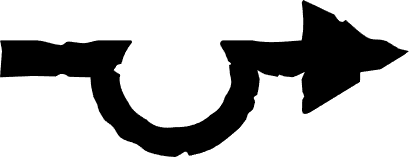
Despite the weakness of the Jonstown write-up, despite the RuneQuest system, and despite the other shortcomings discussed above and raised by clever people on the internet, I still think Chaosium did a great job of packaging a complicated system and a deep complex setting into an attractive boxed set. It’s got more epic adventuring, beautiful maps, and fun characters to play in it than you’d get elsewhere for that price. That’s why I put it in the top 3 starter sets I own. It’s not perfect but then again, what is? Let’s not armchair this for too long! Go ahead and play the adventures! That’s how Glorantha really comes alive.
But there’s tough competition out there, so hopefully Chaosium will keep iterating on their products in the years to come. Meanwhile, I need to dig deeper in the Symbaroum and One Ring Starter Sets! Oh my, so many games, so little time…
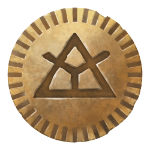
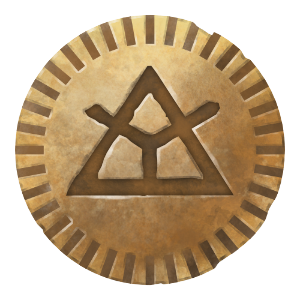
One comment on “Bis Repetita: RuneQuest Starter Set”